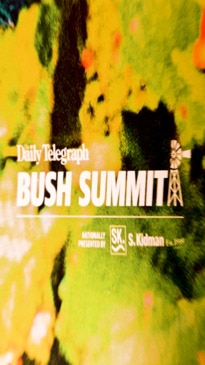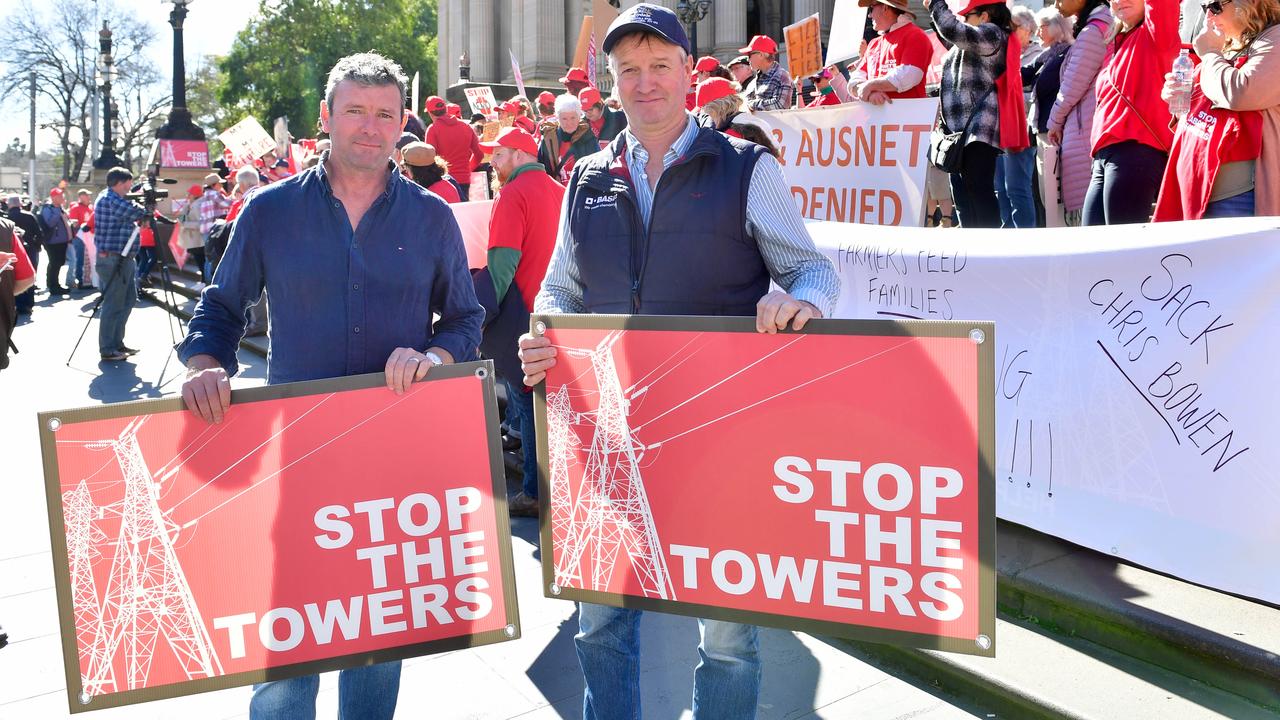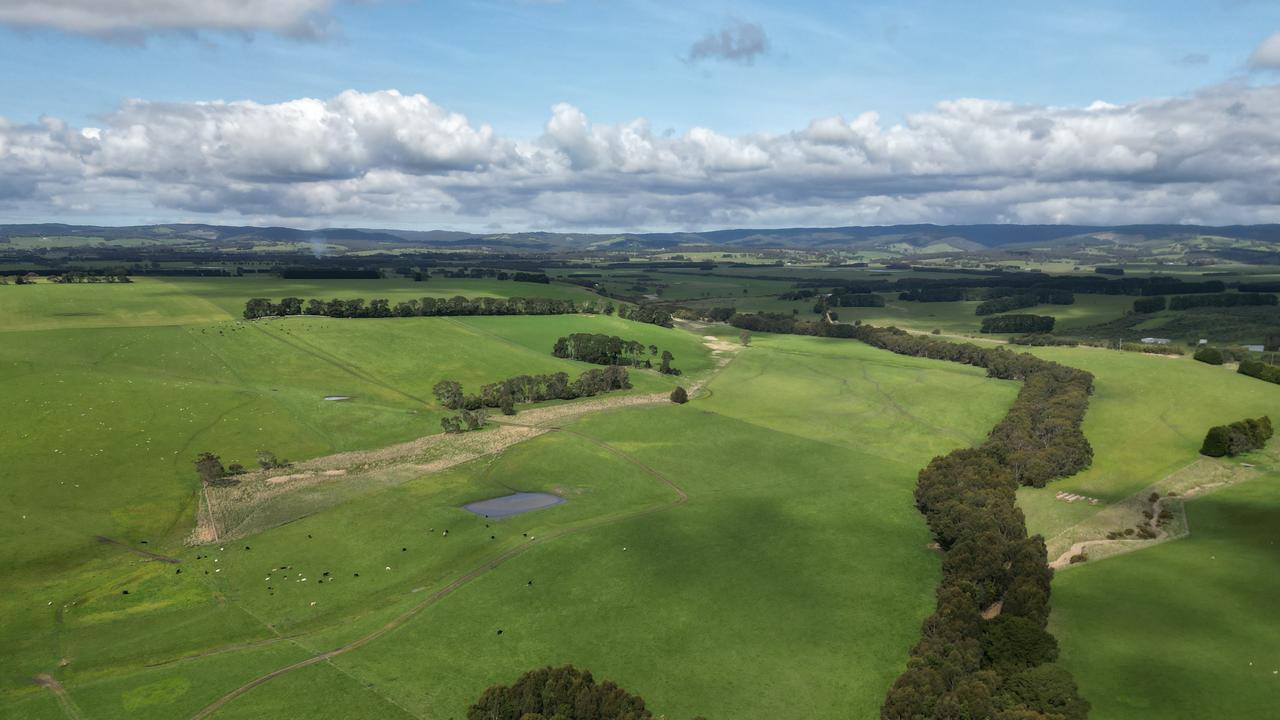VFF presidential candidates Danyel Cucinotta and Brett Hosking on key agri issues
Danyel Cucinotta and Brett Hosking are vying to be the next Victorian Farmers Federation president. We asked them the questions farmers want answered.

The power for farmers to veto construction of transmission lines across their properties has become a key dividing line in the race to become the next president of the Victorian Farmers Federation.
In a series of key questions issued to VFF presidential candidates Danyel Cucinotta and Brett Hosking, both contenders were asked if they backed a farmer veto following years of controversy over the construction of the Victoria-NSW Interconnector West project.
Mr Hosking said he backed a veto while Ms Cucinotta was not definitive on the concept, only weeks after the release of the route for the controversial high-voltage transmission line cutting through northern Victoria.
“Having right of veto means that transmission developers have to incentivise farmers and communities rather than force them against their will,” he said.
Ms Cucinotta said she backed “realistic and achievable outcomes” but declined to support or oppose the veto concept.
“Farmers deserve fair engagement and consultation about the way their farms and land will be impacted from policy and regulations no matter the issue.”
Both were asked their views on the VFF’s financial situation, the farmer municipal rates burden and other issues ahead of an online forum, to be hosted on Thursday evening by The Weekly Times journalist Alexandra Laskie.
WEEKLY TIMES:The VFF’s finances are in the red. Do you plan to sell Farrer House? Will you reintroduce levies for dairy and grains, or broaden them to other commodities?
Should the VFF get a guaranteed portion of the Livestock Compensation Funds (cattle, sheep and goat, swine and bee)?
CUCINOTTA: “As chair of the VFF it’ll be my responsibility along with the board to ensure we are financially responsible and prioritise our resources to advocate on behalf of Victorian farmers. There is no ability for a single member of the board to sell off an asset. I will focus on growth and expanding our revenue streams that positively impact our membership. The VFF has been successful in obtaining and running the stock sense project for a number of years and will continue to apply for grants that promote and protect agriculture across Victoria.”
HOSKING: Members have seen enough income earning assets sold to cover spending over the past few years. A board I lead will focus on sensible management, prudent spending and strong investment management to recover VFF finances. Levies are a good option says they match VFF income to the success of the industry and while livestock compensation funds could and should be used for valuable extension work, any other use by VFF would require changes to legislation.
****
WEEKLY TIMES: What’s your specific plan to recruit members? Do you have a numeric target?
CUCINOTTA: “The VFF has less than 10 per cent of its members under the age of 44 and there is great opportunity to target the next generation of farmers to not only increase membership numbers but improve it’s social license and showcase the incredible talent that exists.
HOSKING: “Having led many membership organisations I know engagement and activity are critical drivers of membership growth. VFF needs to start talking with, and listening to it’s members and then deliver the results they need for our membership to grow.”
****
WEEKLY TIMES: Are you supportive of the VFF’s withdrawal from the NFF and ADF? Do you plan to rejoin either of those organisations?
CUCINOTTA: “My priority to Victorian farmers is to ensure their state and local issues are addressed and VFF is adequately resourced to be a strong and united voice on their behalf. I look forward to working with all stakeholders on both state and national issues.
HOSKING: “Farmers and communities must be front of mind for decision makers which means being relevant nationally through NFF and peak bodies Biosecurity, Trade, Water, RDC oversight and so much more happens through these groups it’s sensible leadership to represent Victorian farmers at these organisations.”
****
WEEKLY TIMES: Should farmers have power of veto over the construction of transmission lines across their properties?
CUCINOTTA: “Farmers deserve fair engagement and consultation about the way their farms and land will be impacted from policy and regulations no matter the issue. The VFF will continue to fight for realistic and achievable outcomes that protect Agriculture and our communities.
HOSKING: “Yes. Currently farmers are treated as collateral in projects being built on their own valuable farmland – this is unacceptable! Farmers and communities must be valued as partners with any infrastructure development and at times say no to the wrong development in the wrong place. Having right of veto means that transmission developers have to incentivise farmers and communities rather than force them against their will.”
****
WEEKLY TIMES:Should animal sentience be recognised in the Animal Care Protection Bill?
CUCINOTTA: “As farmers we already agree our animals can think and feel the world around them. That’s why we care about them 24/7 and love the work we do. The risk for The animal care and protection bill doesn’t fall within the definition of sentience but rather the regulations that will be drafted in 2025.
HOSKING: “Welfare can never be decided by whether someone perceives an animal to be happy or sad. Good welfare practices are objective and a word open to interpretation such as sentience is a lazy addition to good legislation.”
****
WEEKLY TIMES:How do you specifically curb the council rate burden on farmers? What is your alternative to the current rates structure?
CUCINOTTA: “I will ensure strong leadership at state level to fight back what is quite simply, bad policy. VFF will also focus on local advocacy strategies that empower communities to fight for a fairer distribution across land types.”
HOSKING: “The funding model for rural councils is broken. Urban councils pocket more from parking fines than our rural councils do from rates. We need a statewide restructure of funding for rural shires led by a united VFF putting forward a sensible and modern case.”




